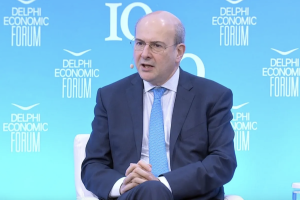More than two-thirds of citizens in the European Union, with Greeks having the highest percentages, believe that corruption is “rampant” in their countries, according to the Eurobarometer survey published on Wednesday.
In Greece, an overwhelming 98% of citizens believe that corruption is pervasive, a contrast to the EU average of 68%. While countries like Portugal, Malta, and Slovenia also report high levels of perceived corruption, Finland, Denmark, and Luxembourg have recorded significantly lower figures.
Examining the past three years, Greeks are notably pessimistic about corruption trends: 53% think corruption has worsened, 38% feel the situation has remained unchanged, and only 5% believe it has improved. For comparison, the European averages are 41%, 43%, and 9%, respectively.
The survey highlights a significant distrust among Greeks towards their institutions.
A striking 71% of Greeks perceive corruption within political parties, compared to 53% elsewhere in Europe.
Furthermore, 68% believe politicians are bribed and misuse their power for personal gain, while 50% of Europeans hold this view.
Corruption is also widely suspected among officials handling public contracts and building permits, with 67% and 63% of Greeks expressing concern, respectively. This is notably higher than the 37% and 36% seen in other European countries.
Trust in private businesses is also lower in Greece, with 24% of Greeks perceiving corruption in this sector, compared to 31% in Europe as a whole.
The Greek healthcare system is viewed as highly corrupt by 89% of citizens, a significant disparity from the 27% average across Europe.
Additionally, 59% believe supervisory authorities are corrupt, as opposed to 27% in other European countries.
Concerns about banks and financial organizations are expressed by 29% of Greeks, while 25% of Europeans share this view.
Interestingly, approximately one-quarter of Europeans (27%) report personal experience with corruption in their daily lives, with 75% believing that close ties between businesses and politics create an environment ripe for corruption.




